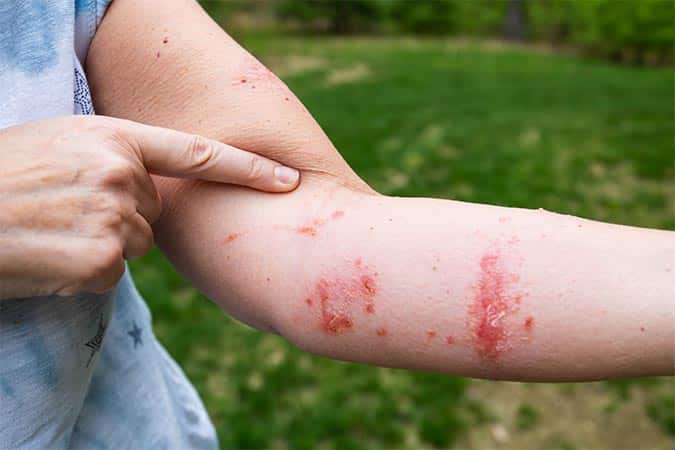What is Poison Ivy?
Poison ivy is a common poisonous plant that causes a skin rash. The rash is caused by an allergic reaction to the oily resin urushiol, which is found in the leaves, stems, and roots of poison ivy, poison oak, and poison sumac. This rash often appears in a straight line because of the way the plant or your fingers spread it against the skin. Poison ivy may be more spread out if highly allergic or you come into contact with a piece of clothing or pet fur that has urushiol on it. This reaction usually shows up about 12-48 hours after exposure and can last for 2-3 weeks.
Common signs and symptoms of a poison ivy rash include:
- Itching
- Redness
- Blisters
- Swelling
You can get a poison ivy rash from touching the plant itself, or from touching contaminated objects. Be sure to seek emergency medical help if you have inhaled the smoke from burning poison ivy, as this can cause difficulty breathing.
Who is a Good Candidate for Poison Ivy Treatment?
Anyone who is experiencing a rash due to contact with poison ivy can benefit from treatment. If your rash is widespread with many blisters and is causing great discomfort, it is especially important that you see a dermatologist in order to properly treat your symptoms. Contact our office today to schedule a consultation with one of our dermatologists for an assessment and treatment of your rash.
What to Expect During Poison Ivy Treatment?
During your appointment, your dermatologist will be able to diagnose poison ivy by looking at it. The rash usually goes away on its own within 2-3 weeks, but often requires therapy. Treatment options include:
- Corticosteroids: Potent topical corticosteroids are utilized for most mild cases. If your poison ivy rash is more widespread with a severe itch, many blisters, or facial involvement, an oral corticosteroid may be prescribed to quickly reduce the inflammation.
- Antibiotics: If a bacterial infection has developed at the site of the rash, oral antibiotics may be prescribed.
- OTC creams: Over-the-counter (OTC) cortisone creams can be used for the first few days to reduce the itch.
- Antihistamines: Oral antihistamines such as Benadryl can help with symptoms.
Following Poison Ivy Treatment
Poison ivy treatments are meant to lessen the side effects of the rash until it has gone away. Patients will notice less itching and redness than if they did not receive treatment.
In order to prevent future poison ivy rash, we recommend you follow these tips:
- Avoid the plants: Learn how to identify poison ivy, poison sumac, and poison oaks so you can avoid them.
- Dress appropriately: When spending time outdoors in areas where poison plants may live, be sure to protect your skin with the appropriate clothing.
- Remove the plants: If you see poison ivy in your own yard or garden, apply a herbicide to them to kill them. Do not burn these plants, as the oil urushiol can be carried by smoke.
Schedule a Consultation
If you are in need of poison ivy treatment, contact HMGS Dermatology today to schedule your initial consultation with one of our dermatology specialists. Alternatively, our Telehealth platform is ideally suited for fast diagnosis and effective treatment for poison ivy.

Get Started With A Visit!
Fill out the form below and we will reach out to you shortly to schedule an appointment.